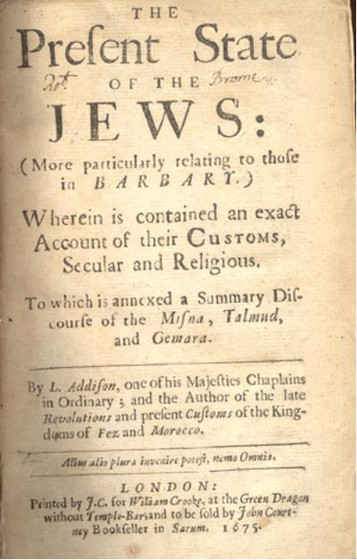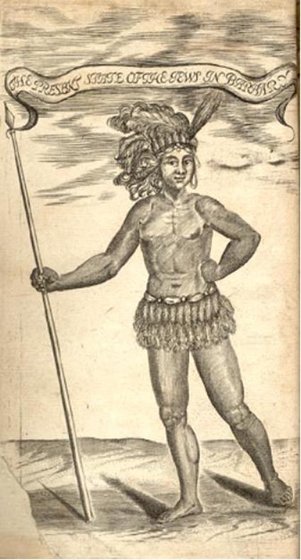THE PRESENT STATE OF THE JEWS; MORE PARTICULARLY RELATING TO THOSE IN BARBARY ; WHEREIN IS CONTAINED AN EXACT ACCOUNT OF THEIR CUSTOMS, SECULAR AND RELIGIOUS ; TO WHICH IS ANNEXED, A SUMMARY DISCOURSE OF THE MISNA, TALMUD, AND GEMARA.
Addison, Lancelot
| Numéro d'objet: |
9 |
| Date: |
1675 |
| Genre: |
Livre |
| Lieu: |
Londres |
| Sujet: |
Ethnologie / Ethnographie |
Recherche dans "Notes":
• The Reverend Lancelot Addison (1632 - 1703) was the father of Joseph Addison the poet, essayist and politician who founded The Spectator with Richard Steele. Lancelot was educated at Queens College, Oxford and then spent 7 years in the 1660s working in Tangier as chaplain. On his return he wrote "West Barbary, or a Short Narrative of the Revolutions of the Kingdoms of Fez and Morocco" (1671). In 1670 he was appointed royal chaplain or Chaplain in Ordinary to the King, in 1683 he became Dean of Lichfield, and in 1684 Archdeacon of Coventry. "The Present State of the Jews" is a detailed study of the Jewish population of the Barbary Coast of North Africa in the seventeenth century, their customs, laws and their religious behaviour. The first edition of 1675 had for subtitle '(more particularly relating to those in Barbary)' which was for some reason omitted from our edition but the banner at the top of the frontispiece reads: The Present State of the Jews of Barbary
Addison (1632[-]1703) was an outspoken supporter of the High Church faction of the Church of England during the Commonwealth. His ordination was delayed until the Restoration when he was also appointed chaplain to Lord Teviot, who later served as Governor of Tangier for King Charles II. Addison lived in the English garrison town of Tangier for eight years.
Addison,L[ancelot].
The Present State of the Jews:
Wherein is Contained an Exact Account of their Customs, Secular and Religious. To which is annexed a summary discourse of the Misna, Talmud, & Gemara.First edition 1675. Title in black. Engraved frontispiece of native Indian in local dress, masthead above reads,
“The Present State of the Jews in Barbary” pp.(12), 247, (5). 12mo.
Bibliotheca Anglo-Judaica, p. 394, no.22;
London, for William Crooke: 1675.
1675. Addison, Lancelot. - The present State of the Jews; more particularly relating to those in Barbary ; wherein is contained an Exact Account of their customs, Secular and Religious ; to which is annexed, a summary discourse of the Misna, Talmud, and Gemara. London : 8vo, pp.247, with a frontispiece of a naked savage, evidently the publisher's idea of a Barbary Moor. 2nd ed., 1676 ; 3rd ed., 12mo, 1682.
ADDISON Lancelot
The Present state of the Jews. Londres, W. Crooke 1676; in-12 demi-basane à coins, dos à nerfs, dos et coins émoussés, mors fendu sur 5 cm.; frontispice, seconde édition Ex-libris: Alfred Rubens. (Playfair 265 - Delouya 35) Lancelot Addison (1632-1703) un des chapelains du roi d'Angleterre et qui avait vécu plusieurs années à Tanger. Ce livre, probablement le premier consacré surtout aux Juifs d'Afrique du nord et en particulier du Maroc.
The Present State of the Jews, par Lancelot Addison, chapelain du roi d'Angleterre, Londres, 1676
Œuvre d'un clergyman anglican, ce livre décrit les croyances, pratiques et fêtes religieuses des Juifs de "Barbarie". L'auteur connaît le Maroc pour avoir vécu à Tanger pendant sept ans. Il a également publié en 1671 : West Barbary, or a Short Narrative of the Revolutions of the Kingdoms of Fez and Morocco.
C'est probablement l'un des premiers livres consacrés aux Juifs d'Afrique du Nord, mais d'après certains auteurs, il reprend en partie les éléments de la traduction anglaise de l'ouvrage de Johannes Buxtorf, Synagoga Judaica (1603) qui se rapporte au judaïsme allemand (The Jewish Synagogue, or an Historical Narration of the State of the Jewes, Londres, 1657). Certains passages démontrent néanmoins sa connaissance du Maroc, notamment le chapitre sur l'éducation qui mentionne les langues pratiquées par les juifs : le "maure", l'espagnol et l'hébreu.
Le texte est globalement favorable aux Juifs dont plusieurs vertus et comportements sont vantés (tempérance, culte de la famille, éducation, charité, etc.), même si l'auteur chrétien leur reproche leur obstination à ne pas reconnaître la nature messianique et divine de Jésus.
Illustration:
1 Gravure d'un juif du Maroc



